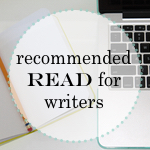
Short recap:
I’ve begun a new blog series about my writing journey… I’ve started writing a new novel (completely from scratch) and I want to share every single step with you.
Check out my previous posts:
Blog Series: Writing a New Novel
I thought I had an IDEA. I didn’t.
What comes first, characters or plot?
So I’ve promised to share not only my experiences but also the resources I’m using, and so I thought I’d take a day to write about a book that’s really made an impact on me as a writer.
I can’t remember exactly when, but someone recommended Donald Maass’ Writing the Breakout Novel and swore that it was an excellent resource for writers. I read it for the first time about a year ago (and wrote a review, which actually sums up my thoughts quite nicely!). And then recently, someone in my writers group referenced the book and I knew I needed to reread it. I immediately ordered a copy from Amazon and waited anxiously for it to arrive.
I’m already over halfway through.
It IS an excellent resource for writers – for aspiring writers, novice writers, experienced writers. The book is about writing a ‘breakout’ novel. What is a breakout novel?
A breakout novel is “deeper, stronger, and more memorable.” A breakout novel is “highly detailed and generally complex.” Maass points out that genre is not necessarily a factor, and that “what matters is that your characters, your story and your fictional world live for you intensely.”
But how do you tell whether you’ve achieved breakout status?
Maass writes, “There is no agreement in the book business about what exactly constitutes a ‘breakout,’ let alone what is a breakout novel. It is, and should be, many things. Breakouts can happen on many sales levels. The first novel that soars to a top five spot on The New York Times best-seller list is the dream breakout scenario. For me, however, any sharp upward movement in sales and in attention paid to a novelist by publishers, bookstores, the press and the public is a breakout. Some may be mini breakouts, but all growth is good.”
I don’t believe that simply by reading this book I’ll write a breakout novel in one draft. I’m not sure I can write a breakout novel even with a second, third, or fourth draft. That’s actually not the point.
The point is to recognize what makes a story great and to have those elements in the back of my mind as I’m writing. I want to be aware of what sets a story apart and to always strive for it. Because I think, for many of us, the “breakout novel” is less about sales or recognition and more about our desire for improvement. Why do we write? It’s not because we hope to be published (although we do!) but because we love writing.
(Was that too deep? Whew.)
Seriously though, BUY THE BOOK. And read it. And then read it again. 😉
I’ll continue to reference this book in my following posts! There’s so much to learn!
